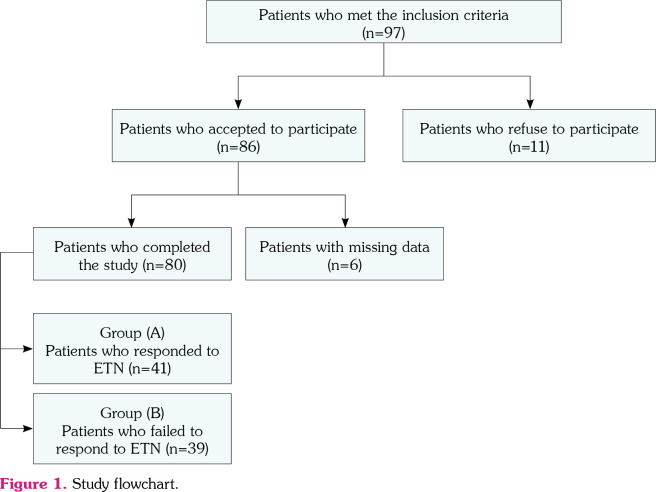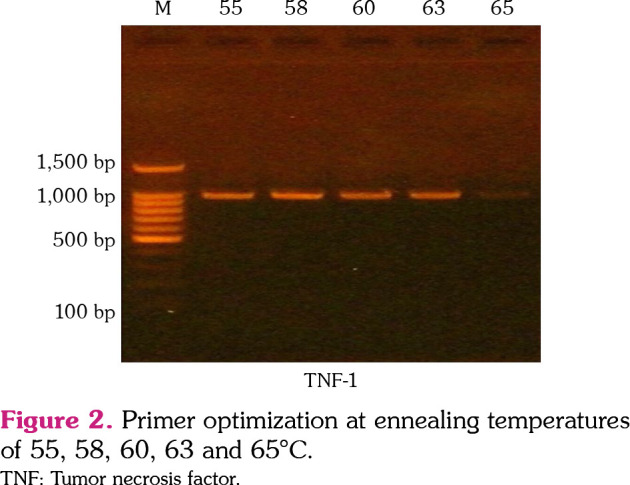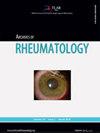伊拉克类风湿关节炎患者肿瘤坏死因子- α启动子区基因-308G/A、-857C/T和-863C/A位点多态性与依那西普反应的关系
IF 1.1
4区 医学
Q4 Medicine
引用次数: 4
摘要
目的:本研究旨在评价肿瘤坏死因子-α (TNF-α)基因启动子区-308G/A、-857C/T和-863C/A位点多态性与依那西普无应答倾向之间的关系。患者与方法:2020年10月~ 2021年8月,共80例患者(男10例,女70例;平均年龄:50岁;范围:30 - 72岁)类风湿性关节炎(RA)患者接受依那西普治疗至少6个月。根据患者连续治疗6个月后的反应,将患者分为有反应组和无反应组。对提取的脱氧核糖核酸进行聚合酶链反应扩增后,采用Sanger法进行测序,鉴定TNF-α启动子区域的多态性。结果:应答组GG基因型(-308G/A)和AA基因型(-863C/A)均显著存在。CC基因型(-863C/A)在无反应组中显著存在。(-863C/A) SNP的CC是唯一增加依那西普耐药可能性的基因型。GG基因型(-308G/A)与无应答的可能性呈负相关。(-857CC)和(-863CC)基因型在无反应组中更为普遍。结论:(-863CC)基因型的存在,单独或联合(-857CC),与依那西普无应答的可能性增加有关。GG基因型-308G/A和AA基因型-863C/A显著增加依那西普的应答可能性。本文章由计算机程序翻译,如有差异,请以英文原文为准。


Association of tumor necrosis factor-alpha promoter region gene polymorphism at positions -308G/A, -857C/T, and -863C/A with etanercept response in Iraqi rheumatoid arthritis patients.
Objectives This study aims to evaluate the association between polymorphisms in the promoter region of the tumor necrosis factor-alpha (TNF-α) gene at locations -308G/A, -857C/T, and -863C/A with the tendency of being non-responder to etanercept. Patients and methods Between October 2020 and August 2021, a total of 80 patients (10 males, 70 females; mean age: 50 years; range, 30 to 72 years) with rheumatoid arthritis (RA) receiving etanercept for at least six months were included. The patients were divided into two groups responders and non-responders, based on their response after six months of continuous treatment. Following polymerase chain reaction amplification of the extracted deoxyribonucleic acid, sequencing by Sanger method was performed to identify the polymorphism at the TNF-α promoter region. Results In the responder group, the GG genotype of (-308G/A) and the AA genotype of (-863C/A) were both significantly present. The CC genotype of (-863C/A) was significantly present in the non-responders group. The CC of (-863C/A) SNP was the only genotype that appeared to increase the likelihood of being resistant to etanercept. The GG genotype of (-308G/A) was negatively correlated with the likelihood of being a non-responder. The (-857CC) and (-863CC) genotypes were significantly more prevalent in the non-responders group. Conclusion The presence of the (-863CC) genotype, alone or in combination with (-857CC), is linked to an increased likelihood of becoming a non-responder to etanercept. The GG genotype of -308G/A and the AA genotype of -863C/A significantly increase the likelihood of becoming responder to etanercept.
求助全文
通过发布文献求助,成功后即可免费获取论文全文。
去求助
来源期刊

Archives of rheumatology
Medicine-Rheumatology
CiteScore
2.00
自引率
9.10%
发文量
15
期刊介绍:
The Archives of Rheumatology is an official journal of the Turkish League Against Rheumatism (TLAR) and is published quarterly in March, June, September, and December. It publishes original work on all aspects of rheumatology and disorders of the musculoskeletal system. The priority of the Archives of Rheumatology is to publish high-quality original research articles, especially in inflammatory rheumatic disorders. In addition to research articles, brief reports, reviews, editorials, letters to the editor can also be published. It is an independent peer-reviewed international journal printed in English. Manuscripts are refereed by a "double-blind peer-reviewed" process for both referees and authors.
Editorial Board of the Archives of Rheumatology works under the principles of The World Association of Medical Editors (WAME), the International Council of Medical Journal Editors (ICMJE), and Committee on Publication Ethics (COPE).
 求助内容:
求助内容: 应助结果提醒方式:
应助结果提醒方式:


